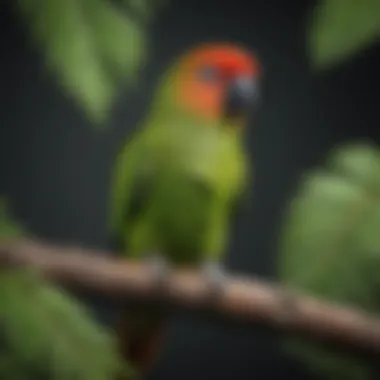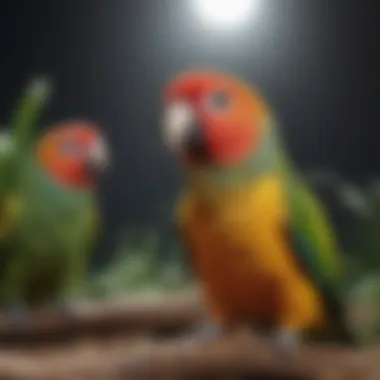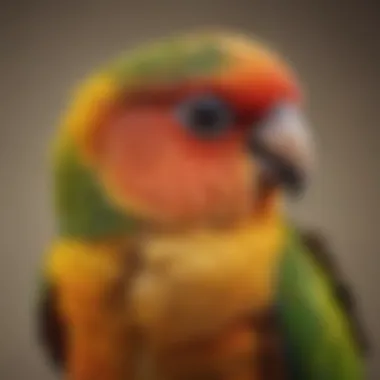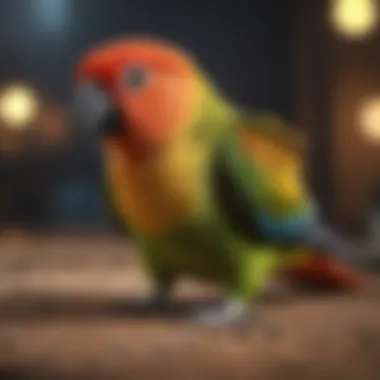Understanding Conure Bird Prices: Essential Insights


Intro
This article investigates the many elements that affect the cost of conure birds, known and loved by lots. By focusing on the different species available, insights into how age and gender play a part in the price, and the contrast between breeders and pet stores, a rounded view is presented. Beyond just purchase costs, we will discuss ongoing care expenses that potential owners must consider. Additionally, an exploration of the emotional and financial responsibilities accompanying conure ownership is critical. With all this knowledge, potential conure owners will find themselves better prepared for this vibrant commitment.
Avian Care Basics
Two important topics revolve around proper care and financial obligations when choosing a pet or companion like a conure. Owners are encouraged to grasp the fundamental aspects needed for a bird's successful nurturing. It is not merely about just the price of the bird itself but also the long-term requirements.
Importance of Proper Nutrition
Nutrition is key to the well-being of a conure. These birds thrive on a balanced diet that usually includes high-quality pellets, fresh fruits, vegetables, and occasional nuts. Many owners ignore the role of vitamins and minerals, which are crucial for immune function, feather condition, and overall health. Precise dietary requirements may vary between conure species; thus, familiarize yourself with the specific needs of the conure you wish to acquire.
Understanding Bird Species and Their Needs
Recognition of various conure species informs not just the price but expected behavior. Species like the Green-cheeked Conure or Sun Conure have distinct features and care routines that condition their price. Knowing which species calls to you starts with assembling facts about their characteristics, habitats, and potential health concerns.
Basics of Bird’s Habitat Setup
A conure’s living environment substantially influences its quality of life. Ensure they have a comfortable cage, the right perch sizes, toys for stimulation, and optimal environmental conditions, such as temperature and humidity levels. Setting up a financial plan covering all necessities throws light on actual costs that stem from purchasing just the bird.
Grooming and Hygiene Tips
Regular grooming and sanitation are both essential for your bird's well-being. Encourage behaviors such as regular baths and be cognizant in cleaning their space regularly, promoting health. Incorporate this into your budget, as grooming tools and routines also carry costs.
Interacting with Your Pet Bird
Building a solid bond with your conure is as important as understanding its care and needs. Owner interaction greatly influences not only fun for the owner but the growth of the bird.
Building Trust and Connection
Being consistent and gentle will help in building trust. This is crucial, especially in the initial stages. Creating an environment that feels safe and welcoming, with fewer abrupt movements or loud noises helps.
Training Techniques and Tips
Training can significantly enhance life with a bird. Techniques like positive reinforcement yield encouraging results. Conures often catch on quickly to teaching cues. Including obedience commands contributes greatly to building an enjoyable relationship.
Fun Activities for Bird Owners and Their Birds
Availability of engaging activities plays a part in enhancing bonds. Activities may include play on bird stands, supervised out-of-cage time, and puzzle toys. They not only provide fun but also stimulate the bird’s mind.
Recognizing Bird Cues and Behaviors
Being attuned to specific behaviors speaks volumes about your bird’s mood and comfort. Understanding the cues helps in both bonding with and assessing the timely needs of the bird. Watching out for actions lets you discern instances of joy, anxiety, or need for attention.
Emotional Well-Being of Birds
The emotional health of your conure matters, given their sensitive natures.
The Role of Play and Socialization
Social creatures by design, conures benefit from socialization and regular interactivity with their owners or other pets. Engaging them socially combats boredom and fosters healthy emotional growth.
Enhancing Birds' Emotional Health
Curating a thoughtful environment that promotes type of activities can boost an emotional state. Regular interaction and monitoring moods aids in recognizing needing adjustments to their environment or routine.
Assessing Bird Stress and Remedies
Stress triggers in conures can stem from numerous situations. Understanding signs such as excessive vocalizing changes with eating habits shall guide owners in providing sufficient measures to alleviate sources of stress.
Building Strong Human-Bird Bonds
Fusing variety in routines and connecting through games or tricks bridges deep bonds. Joyful engagement shows them how to trust with owners which opens doors for meaningful support throughout their lives.


Bird Health and Safety
Prioritizing health ensures a better lifespan of the conure.
Common Health Issues and Prevention
Sadly, common problems in conures often range from beak and feather troubles to nutritional deficiencies. Onward, routine check-ups significantly lower risk by identifying these issues early.
Routine Veterinary Care
Choosing a vet specializing in avian health is vital. Quality veterinary care, mixed breed knowledge, and assessing overall pet health combine for protecing their well being in the long-long term.
Environmental Hazards to Avoid
Owners should navigate hazards, ensuring conditions will limit dangers from mechanical items or toxins greenery. Safeguarding your birds living space plays a key role in ensuring their welfare.
Signs of Illness or Distress
Observing closely for symptoms like swaying movements or discharge leads to avoid inevitable moments where distress affects the conure’s life. Identification of these issues is key in moving toward solutions.
Epilogue
Brought together, these aspects showcase the importance of comprehensive planning on caring for conures is multifaceted. In combination with having an appropriate price in initial purchase, future liability grows substantial.
Spending is not just an initial question to consider but an ongoing commitment towards a healthy partnership. As an aspiring conure owner, understanding these matters holistically prepares one for success in long-term relationships.constants and adaptabilitiesfootnotes that you cannot skip with these bright creatures.
For a wealth of further information, visit leading resources like Wikipedia or check forums on Reddit undertaken browsers by owners all around. Each contributor carries unique insights instrumental to aid respective remarks of interested aquirers as they measure repeated purchasing bound.
Preamble to Conure Birds
Conure birds are fascinating creatures that often capture the hearts of both seasoned bird lovers and new pet owners. Understanding these delightful pets is vital for anyone considering bringing a conure into their home. This section outlines various essential aspects to help prospective owners make informed decisions. Comprehending what makes these birds unique fosters awareness of the responsibilities associated with conure ownership. Given the longstanding companionship between humans and birds, it's crucial to delve into specific elements that influence both the selection process and eventual pricing.
Species Overview
Conures belong to a diverse group of birds from the genus Aratinga and others. There are multiple species of conures, each with its attributes, size, and temperament. Popular examples include the Green-cheeked Conure, Sun Conure, and the Jenday Conure. Species differentiation is integral to understanding pricing, as some are more common and accessible than others, impacting their costs.
- The Green-cheeked Conure, widely regarded for its playful disposition and smaller size, generally has a more affordable price point.
- In contrast, the Sun Conure, recognized for its vibrant colors and engaging personality, often remains on the higher end.
- Lastly, species like the Nanday Conure are including j-in the bill, as they are both colorful and friendly.
Striving for the right species requires consideration of lifestyle compatibility and personal preferences. Knowing your options opens pathways not only to adequate pricing but also to fulfilling an essential commitment as a pet owner.
Characteristics and Traits
Conures are celebrated for their lively behavior and vocal abilities. These birds come with a range of characteristics that strongly appeal to pet enthusiasts. Most conures are friendly, curious, and enjoy social interaction. Their high activity level necessitates ample space and toys to engage their instincts.
Knowing various general traits is beneficial for making an informed choice:
- Vocalization: Conures can be quite noisy; understanding this helps prepare for living with their sounds.
- Social Interaction: Most species thrive on companionship, needing regular bonding with humans or other birds.
- Intelligence: Their sharp minds allow for considerable trainability, fostering a fulfilling relationship between bird and owner.
Recognizing these traits ensures that potential owners understand the commitment level. Conures are more than just pets; they are companions in the true sense. Developing a comprehension of these characteristics solidifies the bond between bird and owner, allowing for a thriving environment.
Factors Influencing Conure Bird Prices
Understanding what affects the prices of conure birds is essential for prospective owners. It is a crucial aspect of making informed decisions. Factors such as species variation, age, gender, and breeder reputation all contribute to the overall cost of these beloved avian companions. Here, we will detail these elements to help future owners align their financial planning with their desire for a pet conure.
Species Variation
Species variation among conure birds is one of the primary determinants of pricing. There are numerous species, and each comes with its own price range. For instance, the Sun Conure, known for its vibrant yellow and orange plumage, often has a higher price tag due to its popularity and attractive colors. Conversely, a Green Cheek Conure is generally more affordable yet equally loved for its sweet temperament.
Factors that lead to price differences chalk out not only aesthetics but also rarity. Rarer species, like the Nuance Conure, might command higher prices as they are less widely available.
Furthermore, whether a conure has been selectively bred—leading to unique coloration or traits—might also drive up costs. To potential owners, understanding these differences provides insight into what to expect financially when choosing their feathered friend.
Age of the Bird
The age of a conure immensely impacts its price. Younger birds, particularly those that are hand-fed and socialized, often cost more than their older counterparts. This extra cost is often justified by the early training and social adapting that young birds require, leading to a stronger bond with their owners.


In many cases, an adult conure, while cheaper, may come with its own set of challenges. Older birds may have established behavior patterns or potential health concerns that a new owner should consider. As a result, taking into account the bird's age often influences the total financial commitment of owning a conure.
Gender Pricing Trends
Gender also plays a role in pricing trends for conure birds. For many species, male birds are often considered more desirable due to their tendency to be more vocal and exhibit more pronounced behaviors. This underlying demand can inflate prices in male conures.
On the flip side, female conures might come at a lower price. However, female conures can also display nesting behaviors and may require some specific care. As in other realities of taxonomic nuances, the choice between gender often blends personal preference with financial implications.
Breeder Reputation
Breeder reputation serves as another critical component in the overall pricing of conure birds. Reputable breeders who prioritize bird health and welfare can often charge more than a run-of-the-mill pet shop or an unverified seller.
A well-respected breeder typically invests time and resources into breeding healthy, well-socialized birds. Therefore, the increased cost associated with these birds often correlates positively to their well-being and future suitability as pets. Buyers should perform due diligence when selecting a breeder and ensure they prioritize ethical breeding practices.
Purchasing Sources for Conures
Purchasing a conure requires careful consideration of sources. Where one acquires their bird can significantly affect both the price and the overall experience of ownership. Understanding the different purchasing options available allows prospective owners to make informed decisions. We look at three primary sources: private breeders, pet stores, and rescue groups or shelters. The advantages and disadvantages of each can impact a buyer's choice, as well as the well-being of the bird they intend to bring home.
Private Breeders
Private breeders often provide an in-depth insight into their conures. They may offer a variety of species, and one can often find rare or less common types in these settings. When dealing with a private breeder, buyers have the opportunity to ask specific questions about lineage, health history, and socialization. This gives a richer understanding of what to expect from the bird.
Additionally, established breeders usually have a good reputation among the bird community. They are likely to follow ethical breeding practices, ensuring healthier birds. Buyers can also track the lineage, which is important in understanding traits and behaviors personalized to the species.
However, not all breeders maintain high standards. Potential customers should research thoroughly. Asking for references from other bird owners or checking online reviews are essential steps. Be aware of the freshness of the bird's environment; cleanliness is a priority when selecting a healthy bird from a breeder.
Pet Stores
Buying from pet stores is often the quickest way to acquire a conure. Pet stores generally have multiple birds for selection. This allows prospective owners to view the birds firsthand. It may also give a chance to spot the personality and temperament of individual birds.
On the downside, pet stores may not always carry detailed information regarding the breeding conditions or the health of the animals. Birds sourced from pet shops can roam through multiple suppliers, and their backgrounds can be less clear. Furthermore, these birds may have been housed in suboptimal conditions that impact their health and behavior.
Thus, despite the convenience of purchasing from stores, you should consider visiting multiple locations and asking pertinent questions before choosing a conure. Verifying the natrure of the store can change ones view. Store setup for animals frequently defines experience with conures.
Rescue Groups and Shelters
Adopting from a rescue group or shelter can be both a fulfilling and responsible choice. There are many conures in need of homes, often left without care for various genuine reasons. These birds are typically social, affectionate, and desperate for companionship.
The fees for adoption from rescues often range lower than purchasing a bird from a breeder or store. It can make a considerable impact if monetary constraints are a concern. Moreover, many shelters provide initial veterinary care in their adoption fees. This helps ensure that the new pet arrives in healthier condition.
Choosing to adopt benefit society by limiting overpopulation in pet rescues. That can positively affect future bird-quality owners, educating the masses for avian advancement. It is crucial those considering this path understand that adopted birds may come with unique challenges, particularly if they have a traumatic history. Patience and care should be prioritized.
The source from which one purchased their conure contributes significantly to the bird's temperament, health, and the overall ownership experience.
In summary, reviewing all major sources is essential for a prospective conure owner. Each option comes with distinct advantages and disadvantages, and making the right choice is influenced largely by personal preferences and situations.
Initial Costs of Acquiring a Conure
Acquiring a conure involves more than simply purchasing the bird; it encompasses a range of initial costs that should be carefully considered. Understanding these costs is crucial for prospective owners to ensure they can support their new pet over the long term. Initial expenses do not solely reflect the bird's purchase price but also include housing, supplies, and the necessary adaptations a new owner must make to ensure a supportive environment.
Price Range by Species
The price of a conure can vastly differ among species. For instance, typically, Sun Conures can range from $250 to $400, whereas Green-cheeked Conures often start at about $150 and can go up to $300. Larger varieties like Blue-crowned Conures can demand a higher price, often falling between $400 to $800. This variation is due to factors such as availability, demand, and breeding difficulty for each species. Identifying the right species can inform a potential owner's budget:
- Sun Conure: $250 - $400
- Green-cheeked Conure: $150 - $300
- Blue-crowned Conure: $400 - $800
Investing in the right species aligns with understanding their requirements and how many specific needs come along. These price figures primarily include birds from reputable breeders or retailers. Notably, purchasing from pet stores can sometimes imply higher costs, as they often mark up prices due to competition and overheads.
Age and Training Costs
The age of the bird significantly influences the initial costs. Generally, hand-fed and socialized chicks justify higher prices compared to older, untrained birds. Younger birds tend to adapt better and are often more engaging, making them appealing to first-time owners, but also costlier. People might spend an additional $50 to $100 for chicks over adult birds. It is also vital to reflect on training expenses. Initial training can range from $75 to $150 or more, depending on method and duration. Keeping these factors in mind can help future conure owners adequately prepare for initial investments and minimized surprises ahead.
The combined initial costs of ownership can add up quickly and should be anticipated well ahead of time to provide a comfortable home for your new companion.


In summary, understanding the initial costs of acquiring a conure lies in recognizing how diverse prices can be across species and age. This awareness not only shapes financial commitments but helps ensure that the unique needs of the bird align with the owner's expectations and capabilities.
Ongoing Costs of Ownership
Understanding the ongoing costs of owning a conure is essential for potential bird owners. It is not merely about the initial purchase. Longevity and health cost considerations also require attention. Conures, like all pets, come with ongoing expenses that greatly impact household budgeting. Knowledge of these costs can foster realistic expectations and ensure both parties thrive together over time.
Feeding and Nutrition
Proper nutrition is vital for conures. Pet owners must ensure their birds have a balanced diet, which generally consists of high-quality pellets, fresh fruits, vegetables, and occasional treats. The cost of conure food typically ranges between $20 to $50 per month. Factors affecting these prices include the brand and dietary requirements of the specific bird. One must also remember the importance of offering variety to avoid boredom in feeding.
Consequently, maintaining an adequate supply of fresh food contributes steadily to ongoing costs.
Veterinary Care
Healthcare for a conure is not a luxury but a necessity. Routine veterinary check-ups every year can cost anywhere from $50 up to $150, depending on location and specific services provided. Emergency services or illness can inflate these expenses significantly.
A proactive approach to veterinary care aids in early detection and treatment of potential health issues. This can save both health complications and costs in the long run. It remains crucial for a bird owner to budget accordingly for unexpected health matters.
Habitat and Supplies
Creating a comfortable and safe environment for conures requires appropriate supplies. Bird cages, toys, perches, and bedding must be carefully selected and maintain adequate quality. Initial setup costs can be high, ranging from $100 to $500. However, ongoing supply budget considerations, which include replacing worn items or adding new toys, usually oscillate between $30 and $100 monthly.
Of utmost importance is maintaining a clean habit consisting of regular cage cleaning and timely replacement of supplies to promote the well-being of the bird.
Enrichment and Training Budget
Birds, especially conures, are lively and intelligent. They require mental stimulation and social interaction, critical for their development and happiness. This aspect entails expenses, including training sessions, toys, or games designed to keep the bird engaged. The cost of training sessions with a professional might vary, most ranging from $30 to $60 per meeting, sometimes getting required once every few weeks.
Toys can add another $20 or more every few months, ensuring the bird enjoys continual engagement. This section of budgeting is where individuals may shine based on the active ownership approach adopted. Committing to the enrichment cost is important for a fulfilling relationship with the conure.
Ensuring a financial plan reflecting ongoing costs provides support to potential conure owners. Understanding these factors enables responsible decisions, contributing to a vibrant and affordable lifestyle for both birds and their human companions.
Budgeting for a Conure
Budgeting for conure ownership is crucial. It allows potential owners to grasp both immediate and future costs involved in sustaining a happy and healthy bird. Underestimating these expenses can lead to various challenges, from neglecting basic needs to facing financial strains down the line. Sounds quite stressful, isn't it? It is vital to weigh the commitment to owning a conure closely.
Creating a Care Budget
Establishing a detailed care budget is an essential first step for prospective conure owners. The cost of caring for a conure can be divided into several categories. Here are key areas to focus on:
- Initial Purchase Price: As discussed earlier in the article, the species and age significantly influence this.
- Food Expenses: Conures require a balanced diet. Purchasing high-quality pellets, fresh fruits, and vegetables can contribute substantially to recurring costs.
- Supplies: Enrichment items such as toys, cages, and perches should be factored in.
- Medical Expenses: Regular vet visits and emergency care can vary. Therefore, having pets insured is a choice many new owners consider.
Remember, calculating precise monthly or yearly costs can enhance accountability and emotional preparedness for the care each bird deserves.
Emergency Fund Considerations
Setting aside an emergency fund is a matter of both preparation and prudence. Bird owners should be ready for the unexpected, especially when it comes to health-related matters. This fund can ensure that financial limitations do not impede pet welfare. Consider these points when establishing your emergency fund:
- Nature of Expenses: Unforeseen veterinary bills can quickly escalate. Seasonal illnesses, accidents, or dietary shifts may arise and require swift attention.
- Goal Amount: Aim to set aside a minimum. A 1000 to 1500-dollar range is often viewed with favor by knowledgeable bird owners.
Maintaining this portion of your budget is simple with proper planning and can avert major stressors later on. Begin budgeting for conures today and ensure that you are ready to give them the security they deserve.
The End
Navigating the complexities of conure bird prices is essential for potential owners. This conclusion serves to summarize key financial aspects while emphasizing the commitment that accompanies these vibrant creatures.
Summary of Financial Considerations
Understanding costs associated with owning a conure is crucial for long-term success. Here are some important financial points:
- Initial Purchase Price: Costs can shift depending on species, age, and where one purchases the bird. Some species can be more expensive due to their rarity.
- Ongoing Expenses: Feeding, veterinary visits, and habitat maintenance can add up quickly.
The food should be balanced, nutritious, and may require a bigger budget over time. - Emergency Fund: Life can be unpredictable, especially regarding pet care. Keeping a reserve for emergencies is wise.
Such reserves ensure a pet’s health isn’t compromised by financial challenges.
By keeping these factors in mind, future conure owners will be better prepared for the financial aspects of their decision.
Final Thoughts on Conure Ownership
Owning a conure presents an enriching experience. However, it also demands time, effort, and financial resources. Specific needs are as follows:
- Commitment: Consideration of long-term responsibilities is vital before choosing a bird.
Each parrot has a lifespan of ten years or even longer. - Educational Investment: Knowledge of species-specific care is paramount.
- Social Needs: Conures demand interaction. Without appropriate engagement, they may become stressed or develop behavioral issues.
Purchasing a conure can be fulfilling. Before making that choice, a comprehensive understanding of all shared financial responsibilities can lay the groundwork for successful bird ownership.















